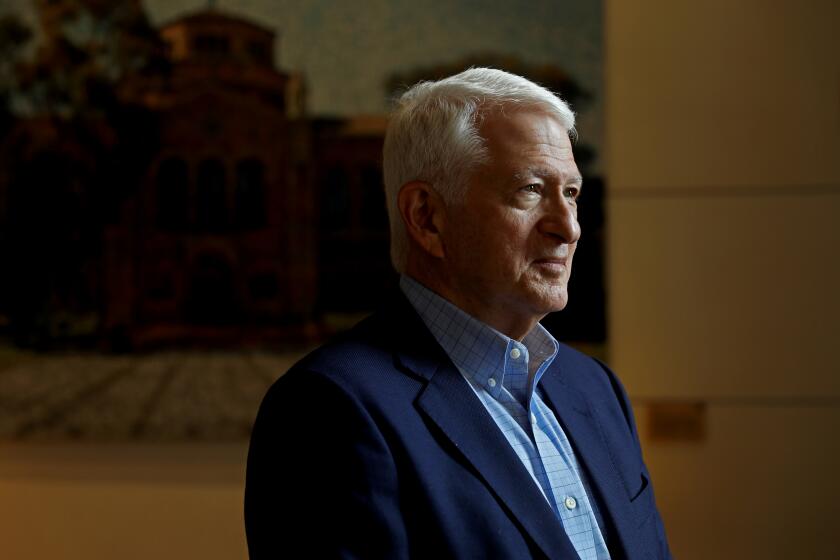Echoes of Illinois on Death Row
Gov. Gray Davis, a strong supporter of the death penalty, says California’s criminal justice system lacks the problems that moved Illinois’ governor to commute all death sentences in his state earlier this month.
“We aren’t seeing the same type of issues that have occurred or that are alleged to have occurred in Illinois,” said Hilary McLean, Davis’ spokeswoman.
But lawyers, scholars and state officials say California’s system shares many of the traits that former Illinois Gov. George Ryan cited as weaknesses in his state’s administration of capital punishment.
As in Illinois, a killer in California is far more likely to be sentenced to death in some counties than others.
California also has its share of weak defense lawyers, whose sloppy work has led to appellate reversals of death sentences.
Beyond that, the kind of errors that plagued the Illinois system are common within criminal justice systems across the nation. Mistakes by eyewitnesses, prosecutorial or police misconduct, incompetent defense work and false testimony by key witnesses, including jailhouse informants, are prime reasons that innocent people end up on death row, scholars say.
“Those exist in every jurisdiction,” said University of Santa Clara law professor Ellen Kreitzberg.
But even if a California governor wanted to follow Ryan’s example, he or she would be barred from emptying death row under California law. An unusual provision of the state Constitution requires California governors to obtain approval from the California Supreme Court before commuting death sentences of inmates who have been convicted of other felonies besides the capital offense.
Ryan’s move has nevertheless put a spotlight on California’s death penalty system, which has generated the largest death row in the nation -- housing more than 600 inmates. The California Supreme Court upholds about 9 of every 10 death sentences it reviews, a rate of affirmation that some scholars say is the highest in the country.
One of the reasons Ryan cited for commuting the sentences of Illinois’ death row inmates was a disparity in sentencing from county to county.
“Should geography be a factor in determining who gets the death sentence?” Ryan asked recently. “I don’t think so, but in Illinois it makes a difference.... A killing with the same circumstances might get 40 years in one county and death in another.”
The same disparity exists in California, where county prosecutors, like those in Illinois, decide whom to charge with capital crimes.
A person who commits a triple murder in San Francisco will not face death because San Francisco’s district attorney does not bring capital charges against defendants.
But if that same person committed the murders across the bay in Oakland, he could be charged with a capital crime, and if convicted, executed.
Whereas Orange, Los Angeles and San Bernardino counties bring capital cases regularly, some small rural counties in California rarely if ever file death penalty cases, in large part because the counties cannot afford the cost of a capital trial, lawyers said.
Incompetent Counsel
Another problem that nagged Ryan was the competence of the lawyers who were defending capital defendants. “We have terrible cases of shabby defense lawyers,” said Ryan, a Republican who was a death penalty supporter when he was elected.
Until this month, California had no statewide rules to help ensure that qualified trial lawyers are appointed to defend suspects accused of capital crimes. The U.S. 9th Circuit Court of Appeals has overturned several death sentences in California on the grounds that defense lawyers were inadequate.
In 2001, the federal court struck down the death sentence of a San Bernardino man after determining that his defense lawyer had been incompetent. The California Supreme Court had upheld the death verdict.
The lawyer, S. Donald Ames, had spent only 40 hours preparing for the capital trial and had a history of racial intolerance, the federal court found. His client in the case was black.
That was the second time the 9th Circuit had overturned a death verdict in a case in which Ames, who died in 2000, had been the defense lawyer.
Yet another client of Ames, Stephen Wayne Anderson, was executed in California last year despite allegations that Ames botched Anderson’s case.
Although Illinois has historically paid its appointed lawyers in death cases less than California, they now receive $125 an hour, said DePaul University professor Andrea Lyon, director of the Center for Justice in Capital Cases.
The rates for representing capital defendants at trial in California vary by county, with some paying lawyers by trial rather than by the hour. In Los Angeles, private lawyers appointed to defend indigent capital defendants receive from $60,000 to $200,000 for a trial, depending on its complexity. If the district attorney decides to seek life without parole instead of death, the defense lawyer’s fee drops to $80 an hour.
New Rules Criticized
Until two years ago, Fresno County required capital lawyers to deduct expenses for investigation from their flat fee. This created a conflict because the more investigators or tests the lawyer used, the less he or she would be paid.
California’s defense lawyers complain that the new standards for appointing capital trial lawyers fail to require counties to give each capital defendant two lawyers at trial.
“Even Alabama requires that,” said UC Berkeley law professor Elisabeth Semel, who runs a death penalty clinic at Boalt Hall.
California Chief Justice Ronald M. George, who heads the policymaking state Judicial Council, which established the new rules for trial lawyers, said capital defendants in California frequently receive two attorneys anyway. The council did not make that a requirement because some cases might not warrant more than one lawyer, George said.
Unlike Illinois, California has not had dramatic examples of death row inmates who were later found to be not guilty due to others’ confessions or newly tested DNA evidence.
Stephen Green, assistant secretary for the Youth and Adult Correctional Agency, said about 65 death row inmates have had their sentences overturned or have been released since 1978.
The Death Penalty Information Center identifies three death row inmates in California since the 1970s who they say were eventually exonerated.
Two of them won retrials in appeals, and subsequent juries acquitted them. One was never retried -- in large part because the crime had occurred so many years before that few witnesses were available to testify again.
In a fourth case, a former death row inmate was acquitted of capital murder in a retrial but convicted of being an accessory to the murder.
Supporters of the death penalty stress that the innocence of the defendants in these cases was never clearly shown.
Execution Defended
“There is no person [who has served time on California’s death row since the death penalty was reinstituted in the 1970s] who has been convincingly shown to be actually innocent,” said Kent Scheidegger, legal director of the Criminal Justice Legal Foundation, a Sacramento-based victims’ rights organization.
A board member of Death Penalty Focus, an anti-death penalty group, on Wednesday released a report that said California does not have in place most of the 85 reforms that an Illinois commission recommended to Ryan last spring.
“California has basically deluded itself into believing that it is progressive, but we don’t have the safeguards,” said Robert Sanger, a criminal defense lawyer who wrote the report.
The Illinois commission recommended a system to make sure that death sentences were reserved for the worst types of murders.
California “makes virtually any murder death eligible as opposed to the recommendations, which would properly narrow the class of murders to a smaller number which are death eligible,” Sanger wrote.
California victims’ rights advocate Scheidegger counters that the Illinois recommendations “had very little to do with protecting the innocent” and more to do with “narrowing the use of the death penalty.”
Gov. Davis also believes that the California system has “a lot of safeguards,” said his spokeswoman, McLean. “In all of the executions that have arisen since the governor has taken office, there hasn’t been a question of guilt,” she said.
At the appellate level, California’s system for appointing lawyers appears to surpass Illinois’. Each death row inmate in California is entitled to a direct appeal based on the evidence presented at trial and a separate constitutional challenge, a process that is similar in states across the country.
Expensive Defense
The hourly rate for appointed capital defense lawyers in an appeal in California is $125, and some appeals cost several hundred thousand dollars, said Chief Justice George. In contrast, Illinois pays a flat $40,000 in attorney fees for each capital defendant’s appeal, according to Lyon.
California also has for years had standards appellate lawyers must meet before the state high court will assign them to capital appeals.
There are now about 142 people on California’s death row who have no lawyer to handle their appeals, one reason that California has executed so few people.
Part of the difficulty in finding lawyers to take appeals is the state’s insistence that the lawyers be up to par, George said.
“I could take care of appointed counsel ... by the end of the week if I didn’t apply those high standards we have ... ,” George said. “We’re just not appointing anybody, and frankly in some states, my information is that anybody is basically eligible for an appointment who is willing to take those cases.”
In the last 18 months, the 9th Circuit overturned about 11 death verdicts that the California Supreme Court had affirmed, according to Los Angeles Deputy Public Defender Terri Towery. The U.S. Supreme Court has reinstated the death sentence in one of those cases and granted review in another, Towery said.
Earlier this month, the California Supreme Court upheld the death sentence of a Los Angeles man, Larry H. Roberts, even after a trial judge who examined the case concluded that prison inmates who testified against Roberts lied on the stand. Chief Justice George and Justice Joyce L. Kennard dissented, and the matter is headed to federal court.
Support Waning
Even as the state high court continues to uphold death sentences, there are indications that California’s support for the death penalty may be waning.
According to figures from the California Supreme Court, 21 defendants were sentenced to death in California last year, down from 25 the year before. Those numbers were the lowest in more than a decade. Officials attribute the drops to reluctant juries, a decline in the murder rate and decisions by prosecutors not to seek death sentences.
Polls also have shown a decline in support for executions among Californians, although a majority continues to say they are in favor of the death penalty. Few believe California is likely to establish a moratorium on executions in the near future.
“If the death penalty at some point is no longer the will of the people, then they could abolish it,” said Lawrence Brown, executive director of the California District Attorneys Assn. “It is important that we should only have the death penalty in California if that is in fact what the public wants.”
*
Researcher Norma Kaufman contributed to this report.
More to Read
Get the L.A. Times Politics newsletter
Deeply reported insights into legislation, politics and policy from Sacramento, Washington and beyond. In your inbox three times per week.
You may occasionally receive promotional content from the Los Angeles Times.







